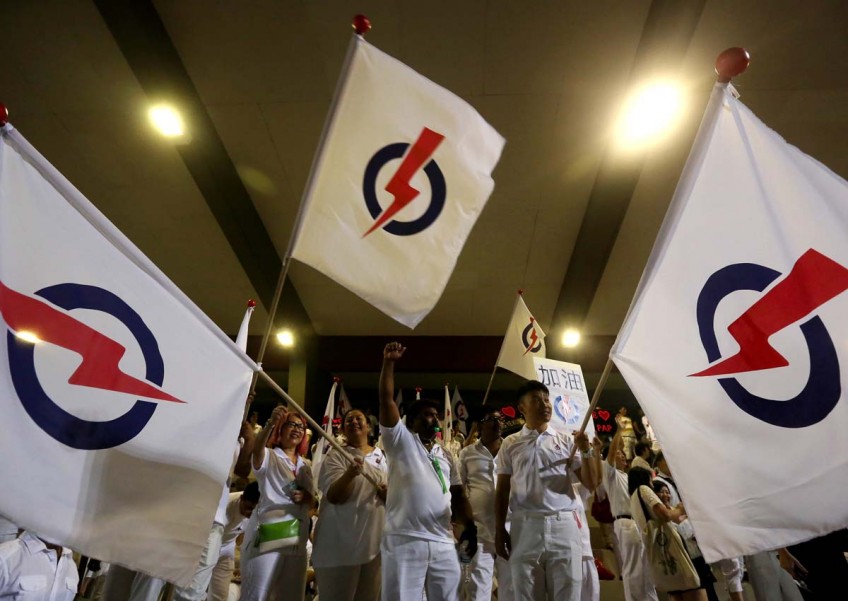Supporters seek to amplify PAP voice online


Shortly after Parliament heard in July that the Electoral Boundaries Review Committee was formed - a precursor to the general election - a People's Action Party (PAP) supporter sprang into action to start a private Facebook group and invited like-minded people to join it.
Named Silent No More - a reference to the oft-mentioned silent majority that supports the PAP and no longer wants to remain quiet - its early members sought to amplify the party's voice on social media during the elections. And they did.
Some members feel their role in calling out and correcting misinformation online played a small part in bringing about the PAP's landslide victory in the Sept 11 polls, which saw the ruling party get 83 out of 89 seats and 69.9 per cent of the popular vote, a swing of nearly 10 percentage points from 2011.
The group now has more than 5,000 members and describes itself as a ground-up initiative started by PAP supporters for fellow supporters. Its main administrator and founder, Mr Jaromel Gee, 25, wrote in July on its Facebook page that it aims to "circulate the correct information online".
"We will also be debunking falsehood about our leaders and the party, backing our claims from official sources," he wrote.
Mr Gee, who is a party member, declined to be interviewed but said the online movement is an individual effort not endorsed by the PAP.
While social media used to be the domain of anti-establishment voices, people like Mr Gee are part of a pushback in recent years as political discourse online evolves.
Institute of Policy Studies (IPS) senior research fellow Tan Tarn How sees the current online political discourse as one that is "more reflective of the ground". He said: "There is now a spectrum of views. In the 2011 elections, there was a bunching of anti-PAP sentiments."
The emergence of pro-PAP online spaces like Facebook groups Fabrications About The PAP and Fabrications Led By Opposition Parties, and several neutral online outfits, has also gone some way to normalise online political chatter.
"This is good for the ruling party because it dilutes the anti-establishment sentiments," he said.
Silent No More counts among its members PAP MPs such as Social and Family Development Minister Tan Chuan-Jin and Tampines GRC MP Baey Yam Keng.
In the weeks leading up to Polling Day, members monitored what netizens said online, tracked opposition candidates' rally speeches, and discussed ways to rebut arguments.
For instance, in one of the Workers' Party rally speeches, party chief Low Thia Khiang had asked how many Singaporeans were able to pay just $8 for a heart operation - a jibe at National Development Minister Khaw Boon Wan, who had said in 2010 that he had paid that amount for a bypass surgery.
Members of Silent No More discussed that Mr Khaw did it through a combination of MediShield, Medisave and private insurance coverage, and encouraged one another to rebut online users who had made fun of Mr Khaw.
IPS' Mr Tan has also noticed a "guerilla-type activism" emerging: "If there is an anti-establishment comment in the Facebook page of a news portal, the first responses are often pro-establishment ones."
Digital management consultant Freda Kwok of QED Consulting, which has been advising some candidates on their social media strategy, said the more savvy ones have moved supporters online.
"The ardent supporters are ready to use their personal accounts to vouch for a candidate, lending their personal credibility to the cause," she added.
Trading and consultancy firm managing director Gerard Hooi, 49, a member of Silent No More, said: "In 2011, the PAP was getting bashed up badly online and no one did anything... With this group, it feels like people are saying that it is time to stop the nonsense."
Mr Baey finds a better balance in views online and described Silent No More, which he was invited to join, as a healthy development.
But he feels the discussion should ideally reflect a spectrum of views and not be skewed towards either end. "Social media users are discerning enough. If the discussion is dominated by pro-establishment voices only, it will lose its credibility too," he said.
leepearl@sph.com.sg

This article was first published on Sept 20, 2015.
Get a copy of The Straits Times or go to straitstimes.com for more stories.